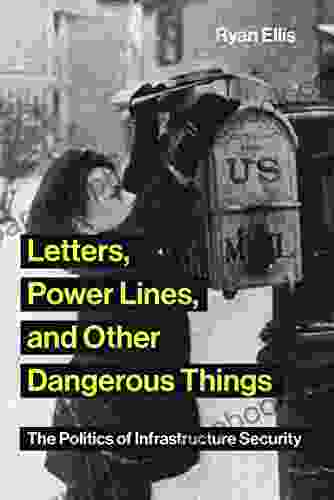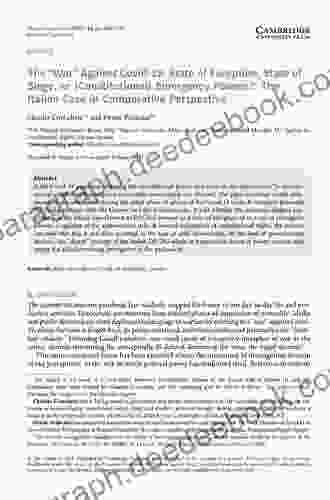The Politics of Infrastructure Security: Infrastructures as Sites of Contestation and Transformation

Infrastructures are essential to modern life. They provide us with the water we drink, the electricity we use, and the transportation we rely on. But infrastructures are not neutral objects. They are shaped by and reflect the power relations and ideologies of the societies in which they are built.
5 out of 5
| Language | : | English |
| File size | : | 9950 KB |
| Text-to-Speech | : | Enabled |
| Enhanced typesetting | : | Enabled |
| Word Wise | : | Enabled |
| Print length | : | 370 pages |
| Screen Reader | : | Supported |
In recent years, there has been growing interest in the politics of infrastructure security. This is due in part to the increasing number of attacks on infrastructure targets, such as the 2015 terrorist attacks in Paris and the 2017 WannaCry ransomware attack. But it is also due to a growing recognition that infrastructures are not simply technical systems, but also social and political constructs.
This article explores the politics of infrastructure security, examining how infrastructures are sites of contestation and transformation. It argues that infrastructures are not neutral objects, but rather are shaped by and reflect the power relations and ideologies of the societies in which they are built. The article draws on examples from the United States, the United Kingdom, and India to illustrate how infrastructures can be used to exclude and marginalize certain groups of people, while also providing opportunities for resistance and empowerment.
Infrastructures as Sites of Contestation
Infrastructures are often seen as neutral objects, but they are in fact sites of contestation. This is because infrastructures are not simply technical systems, but also social and political constructs. They are built by people, and they reflect the values and priorities of those people.
For example, the United States interstate highway system was built in the 1950s and 1960s. This system was designed to connect major cities and facilitate the movement of goods and people. However, the interstate highway system also had a significant impact on the social and economic landscape of the United States. It led to the decline of many small towns and rural areas, and it exacerbated racial segregation in cities.
Another example of infrastructure contestation is the Three Gorges Dam in China. This dam was built in the 1990s and 2000s to provide hydroelectric power and flood control. However, the dam has also had a significant impact on the environment and on the lives of people living in the area. The dam has caused the displacement of millions of people, and it has led to changes in the local climate.
These examples illustrate how infrastructures are not neutral objects, but rather are sites of contestation. Infrastructures are shaped by the power relations and ideologies of the societies in which they are built, and they can have a significant impact on the lives of people living in those societies.
Infrastructures as Sites of Transformation
While infrastructures can be sites of contestation, they can also be sites of transformation. This is because infrastructures can provide opportunities for resistance and empowerment. For example, the interstate highway system in the United States was used by civil rights activists in the 1950s and 1960s to challenge racial segregation. And the Three Gorges Dam in China has been used by environmental activists to raise awareness of the environmental impact of dams.
Another example of infrastructure transformation is the favelas in Brazil. Favelas are informal settlements that are often located on the outskirts of cities. They are often characterized by poor housing conditions, lack of access to basic services, and high levels of crime. However, favelas are also home to a vibrant and resilient community. Residents of favelas have organized to improve their living conditions, and they have created a sense of community and belonging.
These examples illustrate how infrastructures can be sites of transformation. Infrastructures can provide opportunities for resistance and empowerment, and they can help to create more just and sustainable societies.
Infrastructures are essential to modern life. They provide us with the water we drink, the electricity we use, and the transportation we rely on. But infrastructures are not neutral objects. They are shaped by and reflect the power relations and ideologies of the societies in which they are built. Infrastructures can be used to exclude and marginalize certain groups of people, but they can also provide opportunities for resistance and empowerment.
The politics of infrastructure security is a complex and
5 out of 5
| Language | : | English |
| File size | : | 9950 KB |
| Text-to-Speech | : | Enabled |
| Enhanced typesetting | : | Enabled |
| Word Wise | : | Enabled |
| Print length | : | 370 pages |
| Screen Reader | : | Supported |
Do you want to contribute by writing guest posts on this blog?
Please contact us and send us a resume of previous articles that you have written.
 Page
Page Chapter
Chapter Text
Text Story
Story Library
Library E-book
E-book Magazine
Magazine Newspaper
Newspaper Paragraph
Paragraph Shelf
Shelf Glossary
Glossary Foreword
Foreword Footnote
Footnote Scroll
Scroll Codex
Codex Tome
Tome Bestseller
Bestseller Autobiography
Autobiography Reference
Reference Encyclopedia
Encyclopedia Dictionary
Dictionary Thesaurus
Thesaurus Narrator
Narrator Character
Character Resolution
Resolution Librarian
Librarian Catalog
Catalog Borrowing
Borrowing Stacks
Stacks Periodicals
Periodicals Study
Study Scholarly
Scholarly Lending
Lending Journals
Journals Reading Room
Reading Room Rare Books
Rare Books Special Collections
Special Collections Literacy
Literacy Study Group
Study Group Awards
Awards Robert W Compton
Robert W Compton Stephen Fink
Stephen Fink Ares Papadopoulos
Ares Papadopoulos Luciano Saracino
Luciano Saracino E Nesbit
E Nesbit Jeffrey H Jackson
Jeffrey H Jackson Faith Isabel Bloom
Faith Isabel Bloom Christopher J Ryan
Christopher J Ryan Kathleen M Sands
Kathleen M Sands Minki Kim
Minki Kim Sarah Boulard
Sarah Boulard Jon De Lucia
Jon De Lucia Siew Yen Ho
Siew Yen Ho Lanny J Davis
Lanny J Davis Ioannis Anastassakis
Ioannis Anastassakis Kaye Draper
Kaye Draper Carline Anglade Cole
Carline Anglade Cole Thom Nickels
Thom Nickels Mark Avery
Mark Avery Eric Sean Crawford
Eric Sean Crawford
Light bulbAdvertise smarter! Our strategic ad space ensures maximum exposure. Reserve your spot today!

 Ryūnosuke AkutagawaWelding Complete Lenses: A Comprehensive Guide to Enhanced Visibility and Eye...
Ryūnosuke AkutagawaWelding Complete Lenses: A Comprehensive Guide to Enhanced Visibility and Eye... Jaime MitchellFollow ·15.6k
Jaime MitchellFollow ·15.6k Robert BrowningFollow ·17.8k
Robert BrowningFollow ·17.8k Austin FordFollow ·13.2k
Austin FordFollow ·13.2k Troy SimmonsFollow ·15.8k
Troy SimmonsFollow ·15.8k Hudson HayesFollow ·9.1k
Hudson HayesFollow ·9.1k Dalton FosterFollow ·16.8k
Dalton FosterFollow ·16.8k Gilbert CoxFollow ·3.5k
Gilbert CoxFollow ·3.5k Foster HayesFollow ·8k
Foster HayesFollow ·8k

 Ricky Bell
Ricky BellThe Marriage: An Absolutely Jaw-Dropping Psychological...
In the realm of...

 Ray Blair
Ray BlairDiscover the Enchanting Charm of Budapest and Its...
Nestled in the heart of...

 Tyrone Powell
Tyrone PowellHuddle: How Women Unlock Their Collective Power
Huddle is a global movement that empowers...

 Grayson Bell
Grayson BellThe Coin Story of the Holocaust: A Symbol of Hope and...
In the depths of the...

 Virginia Woolf
Virginia WoolfFolklore Performance and Identity in Cuzco, Peru: A...
Nestled amidst...

 Dylan Mitchell
Dylan MitchellThe Enduring Love Story of Héloïse and Abélard: A Tale of...
An Intellectual Passion In the heart of...
5 out of 5
| Language | : | English |
| File size | : | 9950 KB |
| Text-to-Speech | : | Enabled |
| Enhanced typesetting | : | Enabled |
| Word Wise | : | Enabled |
| Print length | : | 370 pages |
| Screen Reader | : | Supported |








